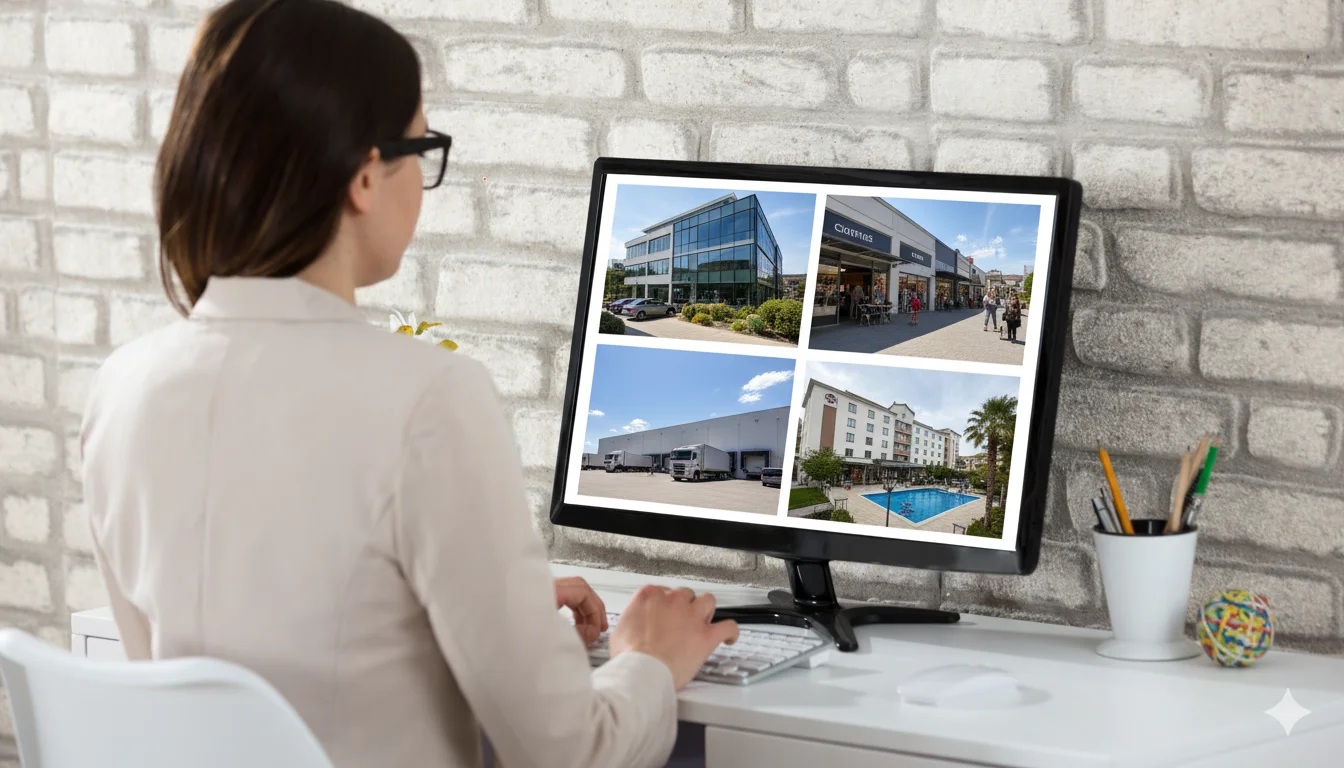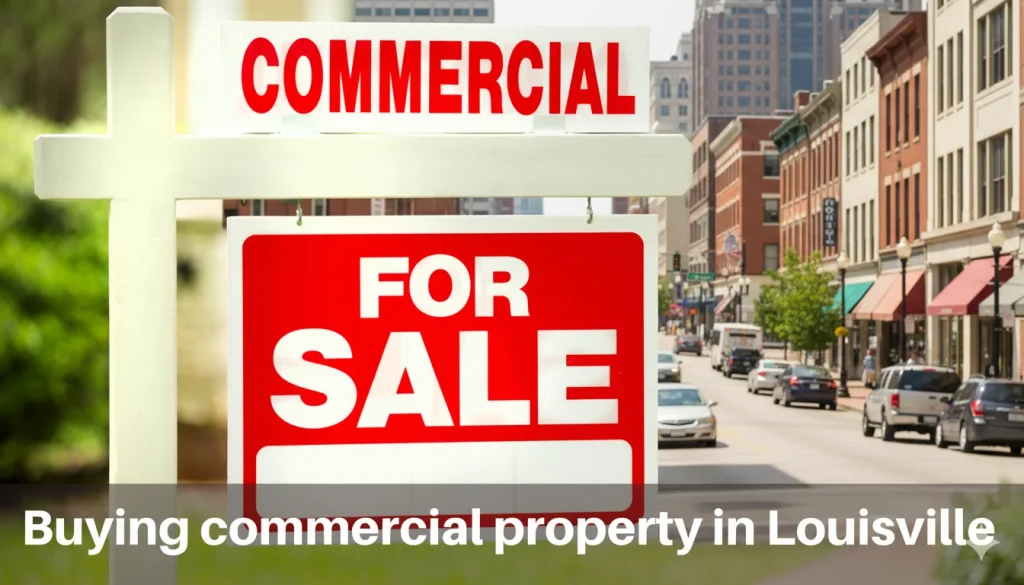Thinking about getting into commercial real estate? Whether you’re planning to open a business or looking to grow your investment portfolio, commercial property can be a solid long-term move. I’ve helped many first-time buyers and seasoned investors navigate this space, and trust me, once you know what to look for, it gets a lot easier.
This guide is here to walk you through every key step so you can make smarter decisions and avoid costly mistakes.
Table of Contents
ToggleBuy Commercial Property Louisville, KY
Buying commercial property means purchasing a space used for business purposes, like offices, retail stores, warehouses, or apartment buildings. It’s often more complex than buying a house, but the income potential and tax advantages make it a serious option for many investors.
Why Invest in Louisville, KY?
-
Steady Economic Growth
Louisville has quietly built a strong foundation for business. It’s home to a mix of major logistics, healthcare, tech, and manufacturing companies. That means there’s consistent demand for spaces like offices, warehouses, and medical buildings. A stable job market and rising population add to the strength of its commercial scene. According to a regional economic “snapshot” published by Ginovus for the Louisville metro, over ten years, employment grew by approximately. 11%, wages by 42%, and the number of companies by 26%
-
Affordable Entry Point
Compared to cities like Nashville or Atlanta, commercial real estate here is far more accessible in terms of price per square foot. That’s great news for new investors or small business owners who don’t have millions to spend upfront.
-
High Demand Across Property Types
Retail corridors are staying active. Industrial zones are growing. Medical office space? Always needed. What’s interesting is how flexible the market is; you can find high-yield multifamily units, steady office spaces, or even raw commercial land ready for development.
-
Tax-Friendly and Pro-Business
The region supports small and medium-sized businesses through grants, opportunity zones, and a fairly business-friendly tax structure. That’s something out-of-state investors especially appreciate when analyzing long-term ROI.
-
A Small Bet That Paid Off
A few years back, a friend of mine, a first-time investor, called me up about a small, standalone retail property just outside the city core. It was priced under $350K, had an existing tenant paying modest rent, and wasn’t flashy by any means. But we ran the numbers, saw potential for a small rent bump, and that it sat right next to a growing residential pocket. He closed within 45 days. Fast forward to today, and it’s nearly doubled in value, and the new tenant (a local bakery) signed a 5-year lease. That one deal turned him into a commercial investor for good.
That’s the kind of opportunity Louisville offers: solid fundamentals, room to grow, and less noise than overhyped markets.
Types of Commercial Property You Can Buy
Office Buildings
Office spaces are a common choice, especially for investors who want stable, long-term tenants. These can range from small professional buildings to multi-story complexes. Tenants often sign leases that last 3 to 10 years, which offers predictable income. But with office properties, location is everything. Areas with good foot traffic, nearby amenities, and strong connectivity tend to perform better. You’ll also want to look into how modern or outdated the infrastructure is; tenants today expect fast internet, updated interiors, and energy-efficient features.
Retail Spaces
Retail has changed a lot in recent years, but it’s still a strong asset class, especially if you’re buying in areas with steady local demand. Think of spaces occupied by salons, barbershops, boutiques, convenience stores, or quick-service restaurants. These smaller retail strips usually perform better in neighborhoods rather than big malls. What makes retail interesting is its visibility; if people are driving or walking past every day, you’re in a good position to attract consistent tenants. Rental rates here often depend on foot traffic, parking, and local competition.
Industrial and Warehouse Units
This sector has exploded thanks to e-commerce, distribution, and logistics demand. Industrial properties include everything from small contractor bays to massive fulfillment centers. These spaces are often located a bit outside the urban core, close to highways or interstates. They’re not glamorous, but they bring in steady tenants like logistics companies, manufacturers, or tradespeople. Maintenance is usually lower, and tenant turnover isn’t as frequent compared to retail or office spaces.
Multifamily Properties
Technically classified as commercial when they have five or more units, multifamily properties are a favorite for investors seeking cash flow. Apartments tend to stay rented even during slower economic times, especially in cities where home ownership is becoming more expensive. With multifamily, you’ll be dealing with more moving parts, from maintenance to tenant turnover, but the return can be strong if managed well. It also helps diversify your risk since income doesn’t rely on a single tenant.
Commercial Land
If you’re thinking long-term, raw land or underutilized parcels can be a smart play. You might find land zoned for commercial use that’s just waiting for the right project, whether it’s a retail strip, an office park, or a mixed-use building. These properties require vision and patience. You’ll need to do due diligence on zoning, utility access, flood zones, and any restrictions. But if you have the right plan, land can be one of the most profitable investments, especially in areas expected to grow.
Special Use Properties
These include things like gas stations, car washes, churches, event halls, or schools. They’re a bit more niche but can offer excellent returns if you understand the specific market they serve. Financing and resale can sometimes be trickier, so it’s smart to have a clear strategy going in.
Every property type has its own rhythm, its own pros and quirks. What really matters is aligning the asset with your goals. Are you looking for steady rental income? Then maybe office or multifamily is your path. Want something with more upside but a bit more risk? Retail or land might be a better fit.
How Much Does Commercial Property Cost in Louisville?
Commercial real estate pricing can vary a lot depending on property type, size, location, condition, and income potential. There’s no one-size-fits-all number, but here’s a practical breakdown to help you get a feel for the market and what to expect.
Office Properties
- Average prices hover around $180 to $200 per square foot
- Smaller professional suites might cost less, especially in suburban areas
- Downtown or fully leased buildings usually command a premium
Industrial/Warehouse Spaces
- Lease rates typically start around $5 to $6 per square foot per year
- For purchase, expect around $80 to $120 per square foot, depending on age and loading access
- Newer logistics or distribution centers cost more but usually offer better tenant profiles
Retail Property
- Ranges from $120 to $300+ per square foot, based on visibility, tenant mix, and location
- Strip centers with national tenants are usually priced higher
- Owner-occupied retail (like restaurants or salons) might be more flexible in price
Multifamily Buildings (5+ units)
- Often priced based on the CAP rate and rental income
- Expect anywhere from $80K to $150K per unit, depending on neighborhood, condition, and tenant stability
- High-demand areas drive prices up significantly
Commercial Land
- Pricing depends heavily on zoning, visibility, and development potential
- Smaller parcels in business corridors can go for $10 to $25 per square foot
- Larger, undeveloped lots further out are often cheaper per square foot, but may lack infrastructure
Here’s a quick snapshot of average costs:
| Property Type | Avg Purchase Price (PSF) | Lease Rate (PSF/Yr) | Notes |
| Office | $180–$200 | $18–$24 | Central locations cost more |
| Industrial/Warehouse | $80–$120 | $5–$6 | Growing demand from logistics |
| Retail | $120–$300+ | $20–$35 | Visibility impacts price |
| Multifamily (5+ units) | $80K–$150K/unit | N/A | Based on rental income |
| Commercial Land | $10–$25 (PSF) | N/A | Zoning and access affect value |
Prices are always moving, but this should give you a strong baseline. It’s also why working with someone who understands the local numbers, not just national trends, can save you time and money.
Where to Find Commercial Listings in Louisville

If you’re ready to start looking at actual properties, the good news is that there are multiple ways to discover commercial listings. But not all listings are created equal; some of the best opportunities never even hit the public websites. Here’s where to look and how to spot the right deals.
Online Platforms
- LoopNet: This is one of the largest commercial real estate listing platforms. It’s a great place to see what’s currently available, from small retail units to large industrial buildings.
- Crexi: Similar to LoopNet, but often features listings that don’t appear elsewhere. It includes property details, financials, and broker contacts.
- PropertyShark: Offers detailed property data, including past sales and zoning information, which can be useful when you’re researching a specific address.
These platforms are helpful for browsing, comparing prices, and getting a sense of the local market. However, they mostly show what’s already public, and sometimes, the best deals never go live there.
Work With a Local Commercial Broker
- A good broker brings access to off-market listings, properties not yet listed online because the seller wants privacy or a faster deal.
- Brokers like myself also know which listings have been sitting for too long, where the seller might be motivated, or when a new opportunity is about to hit the market.
- We can guide you through the buying process, help with negotiations, and recommend trusted pros for inspections, lending, or legal work.
I’ve had clients who spent months searching online before we connected, only to close on a better deal in just a few weeks because it came through a private network.
Other Ways to Find Deals
- Networking with property owners or investors: You’d be surprised how many leads come from just talking to people in the industry.
- Driving for dollars: Sometimes, the old-school approach works. Drive around areas you’re interested in and take note of “For Sale” or vacant commercial buildings.
- County tax auctions or public records: These can occasionally reveal distressed or undervalued properties with good potential.
If you want to stay ahead, don’t just rely on what’s visible online. The real value often comes from the relationships, experience, and insights that only come from working with someone who knows the area inside and out.
Zoning, Permits, and Due Diligence
Understanding Zoning Before You Buy
One of the first things you need to look at when considering any commercial property is zoning. Zoning laws dictate what kind of businesses can operate on a property, how the land can be used, and even what changes you can make. Buying a building zoned for office use won’t help if you want to open a restaurant or industrial facility. It’s not just about the current use, it’s about what’s allowed and what might be restricted down the road. Always ask for a copy of the zoning code and check it against your intended use. You’ll also want to look into whether the area supports rezoning or conditional use permits if your plans don’t match what’s allowed.
The Role of Permits in Your Buying Process
If you’re planning to renovate or change how a space is used, you’ll need the right permits from the city. This includes building permits, occupancy permits, and sometimes even environmental approvals. Permits take time and money, and not having them can delay your project or lead to penalties. It’s a good idea to talk with local planning officials early on or have your broker guide you through the process. I’ve seen buyers close on a property assuming they could easily convert it, only to be told they need months of approvals. That’s time and money lost.
Doing Your Due Diligence the Right Way
This is where things get serious. Before you close, do a full inspection of the property. That means checking the structure, roof, HVAC, plumbing, electrical systems, and more. Also, review leases if there are tenants; are they paying on time? How long are the leases? What are your responsibilities as the new owner? You’ll also want to confirm if there are any liens, unpaid taxes, or legal disputes tied to the property.
One step people often overlook is reviewing the neighborhood itself. Is it growing? Are there new developments nearby? Sometimes, a property looks good on paper, but the area is declining. On the flip side, a property in an up-and-coming zone might be undervalued today and skyrocket in five years. Doing thorough due diligence isn’t just paperwork; it’s about seeing the full picture before you invest.
Final Thoughts
Buying commercial property can feel overwhelming at first, but once you understand the basics and get the right support, it becomes a smart, rewarding move. Whether you’re investing for income or buying a space for your own business, the key is to stay informed, run the numbers, and think long-term.
I’ve helped many people just like you take that first step, and every successful deal started with clear goals and the right guidance. If you’re serious about making it happen, there’s an opportunity waiting; you just need to know where to look.
Let’s Find the Right Property Together
If you’re ready to explore commercial real estate opportunities, I’d be happy to help you every step of the way. I work directly with buyers across Louisville, KY, and surrounding areas to find the right property, whether it’s on the market or off.
Schedule a free consultation here, and let’s talk about your goals, your budget, and how we can make the right move for your future.
Frequently Asked Questions
Is buying commercial property a good investment?
Yes, commercial property can be a solid investment if chosen wisely. It offers the potential for steady cash flow, appreciation, and tax advantages. Just like any investment, it comes with risks, but with the right research and guidance, those risks can be managed.
How is commercial property different from residential?
The biggest difference is in how the property is used and valued. Commercial spaces are leased to businesses, and income is often based on long-term leases and tenant quality. Financing and down payment requirements are also different, usually needing more capital upfront.
Do I need a real estate agent to buy commercial property?
Technically, no, but it’s strongly recommended. A commercial broker brings market knowledge, access to private listings, negotiation skills, and experience with complex deals. Without one, you might miss out on key details that impact your return.
How do I know if a property is priced fairly?
Look at comparable sales, lease rates in the area, condition of the property, and income potential. An experienced broker can help you analyze whether the asking price matches market conditions and financial performance.
What are CAP rates and why do they matter?
CAP rate (Capitalization Rate) is a measure of the expected return on a property, calculated by dividing net operating income by the purchase price. It helps you compare different properties and decide if the return matches your investment goals.

